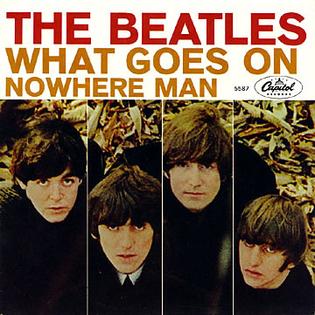
"What Goes On" is a song by the English rock band the Beatles, featured as the eighth track on their 1965 album Rubber Soul. The song was later released as the B-side of the US single "Nowhere Man", and then as the tenth track on the North America-only album Yesterday and Today. It is the only song by the band credited to Lennon–McCartney–Starkey and the only song on Rubber Soul that features Ringo Starr on lead vocals. The song reached number 81 on the US Billboard Hot 100 in 1966.
"Across the Universe" is a song by the English rock band the Beatles. It was written by John Lennon and credited to Lennon–McCartney. The song first appeared on the 1969 various artists' charity compilation album No One's Gonna Change Our World and later, in a different form, on their 1970 album Let It Be, the group's final released album. The original version featured on two different albums both titled Rarities: a 1978 British release and a 1980 US release. It was also included on their 1988 album Past Masters, Volume Two. The song has been covered by many artists, including David Bowie on his 1975 album Young Americans, which featured contributions from Lennon.
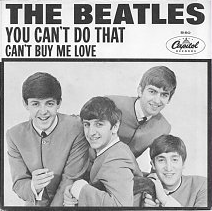
"You Can't Do That" is a song written by John Lennon and released by the English rock band the Beatles as the B-side of their sixth British single "Can't Buy Me Love". It was later released on their third UK album A Hard Day's Night (1964). A live rendition of the song was released on the 2016 re-release of The Beatles at the Hollywood Bowl.

"Cry Baby Cry" is a song by the English rock band the Beatles from their 1968 double album The Beatles. It was written by John Lennon and credited to the Lennon–McCartney partnership. The coda of the song is a short segment referred to as "Can You Take Me Back", written by Paul McCartney, which was actually an outtake from the "I Will" session.

"The Night Before" is a song by the English rock band the Beatles from their 1965 film Help! and soundtrack album of the same name. It was written primarily by Paul McCartney and credited to the Lennon–McCartney partnership. Described as a pop rock or rock and roll song, its lyrics reflect on the singer's last night with his lover before being abandoned.
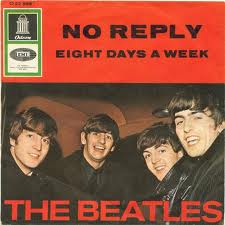
"No Reply" is a song by the English rock band the Beatles from their 1964 album Beatles for Sale. In North America, it was issued on Capitol Records' variant on the British release, Beatles '65. The song was written mainly by John Lennon and credited to Lennon–McCartney. Lennon originally gave the song to another artist managed by Brian Epstein, Tommy Quickly, in June 1964, but Quickly decided not to use it. The Beatles recorded the track in London soon after returning from their first full tour of the United States. The lyrics typify Lennon's more introspective and mature songwriting on the Beatles for Sale album.

"I'll Follow the Sun" is a song by the English rock band the Beatles. It is a ballad written and sung by Paul McCartney and credited to Lennon–McCartney. It was released in 1964 on the Beatles for Sale album in the United Kingdom and on Beatles '65 in the United States. The band played the song on the BBC program Top Gear, and the track was released on On Air – Live at the BBC Volume 2 in 2013.
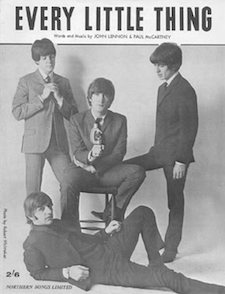
"Every Little Thing" is a song by the English rock band the Beatles from their album Beatles for Sale, issued in the UK in December 1964. Credited to Lennon–McCartney, it was written by Paul McCartney. Capitol Records first issued the song in the US on Beatles VI in June 1965. The track is an early example of the Beatles' use of non-rock instrumentation on a recording, through the addition of timpani drum over the choruses.
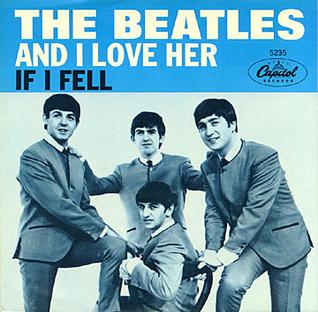
"And I Love Her" is a song recorded by English rock band the Beatles, written primarily by Paul McCartney and credited to the Lennon–McCartney partnership. It is the fifth track of their third UK album A Hard Day's Night and was released 20 July 1964, along with "If I Fell", as a single release by Capitol Records in the United States, reaching No. 12 on the Billboard Hot 100.
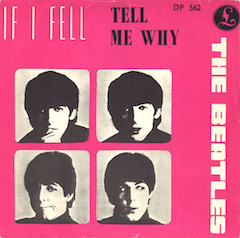
"Tell Me Why" is a song by English rock band the Beatles from their album A Hard Day's Night. In North America, it was released on both the American version of A Hard Day's Night and the album Something New. Credited to Lennon–McCartney, it was written by John Lennon in either Paris or New York City, and recorded in eight takes on 27 February 1964.

"Any Time at All" is a song by the English rock band the Beatles. Credited to the Lennon–McCartney partnership, it was mainly composed by John Lennon, with an instrumental middle eight by Paul McCartney. It first appeared on the Beatles' A Hard Day's Night album.
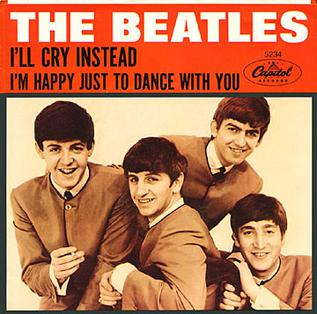
"I'll Cry Instead" is a song written by John Lennon, and recorded by the English rock band the Beatles for their third studio album, A Hard Day's Night (1964), a part-studio and part-soundtrack album to their film of the same name (1964). The song was released as a single in the US and later appeared on the album Something New in the US.

"All I've Got to Do" is a song written by John Lennon and performed by the English rock band the Beatles on their second British album, With the Beatles (1963). In the United States, "All I've Got to Do" originally appeared on Meet the Beatles! (1964). According to Dennis Alstrand, the song is the first time in rock and roll or rock music in which the bass player plays chords as a vital part of the song.
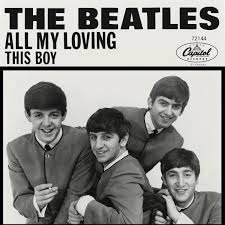
"All My Loving" is a song by the English rock band the Beatles, from their second UK album With the Beatles (1963). It was written by Paul McCartney, and produced by George Martin. Though not officially released as a single in the United Kingdom or the United States, the song drew considerable radio airplay, prompting EMI to issue it as the title track of an EP. The song was released as a single in Canada, where it became a number one hit. The Canadian single was imported into the US in enough quantities to peak at number 45 on the US Billboard Hot 100 in April 1964.
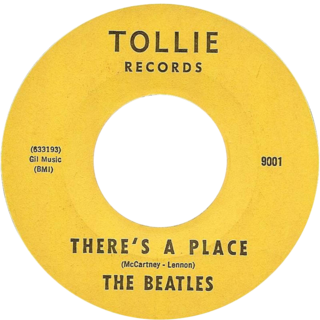
"There's a Place" is a song by the English rock band the Beatles from their debut album, Please Please Me, released in March 1963. It was written primarily by John Lennon and credited to McCartney–Lennon. In the United States, the song was released in July 1963 on the group's first US LP, Introducing... The Beatles, later reissued in January 1964 as Beatlemania surged there. It was also issued as a non-album single in the US, in March 1964, as the B-side to "Twist and Shout", reaching number 74 in the Billboard Hot 100.

"I'm a Loser" is a song by the English rock band the Beatles, originally released on Beatles for Sale in the United Kingdom, later released on Beatles '65 in the United States, both in 1964. Written by John Lennon, and credited to Lennon–McCartney, it was considered for release as a single until Lennon wrote "I Feel Fine".

"Yes It Is" is a song by the English rock band the Beatles. Written by John Lennon, it was first released in 1965 as the B-side to "Ticket to Ride". It features some of the Beatles' most complex and dissonant three-part vocal harmonies and showcases George Harrison's early use of volume pedal guitar. Ian MacDonald describes the song as having "rich and unusual harmonic motion."

"Don't Let Me Down" is a song by the English rock band the Beatles, recorded in 1969 during the Let It Be sessions. It was written by John Lennon and credited to the Lennon–McCartney songwriting partnership. The band recorded the song with keyboardist Billy Preston; the single release with "Get Back" was credited to "the Beatles with Billy Preston". Originally released as a B-side, producer Phil Spector excluded the song from Let It Be. However, it was eventually included on an alternative mix of the album, Let It Be... Naked.
"If You've Got Trouble" is a song written by Lennon–McCartney and recorded by the Beatles on 18 February 1965 with Ringo Starr singing the lead vocal. The song was intended to be Starr's vocal appearance on the Help! album and the Help! film, but the Beatles were not happy with the recording and later chose to cover "Act Naturally" instead. "If You've Got Trouble" remained unreleased until Anthology 2 in 1996.
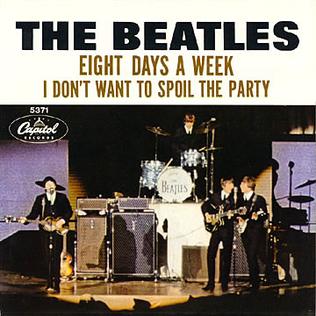
"Eight Days a Week" is a song by the English rock band the Beatles. It was written by Paul McCartney and John Lennon based on McCartney's original idea. The song was released in the United Kingdom in December 1964 on the album Beatles for Sale. In the United States, it was first issued as a single in February 1965 before appearing on the North American release Beatles VI. The song was the band's seventh number 1 single on the Billboard Hot 100, a run of US chart success achieved in just over a year. The single was also number 1 in Canada, Belgium and the Netherlands.

















